Palaeo Jam
Palaeo Jam is a podcast exploring a range of issues in science and the community, using the multidisciplinary aspects of, and public fascination with, palaeontology. Palaeo Jam uses fossils, and other objects from palaeontology, to explore a range of scientific and social issues, and incorporate key research and discoveries into its content. that fancy description aside, it’s really an opportunity for host Michael Mills to chat with palaeontologists and learn some cool things!. Each episode is restricted to a strict, 30-minute timeframe. Each episode has a panel of up to three guests, and is hosted by award-winning science communicator Michael Mills. You can but a Palaeo Jam mug, and eventually others Palaeo Jam merch from the Dinosaur University shop!
Episodes
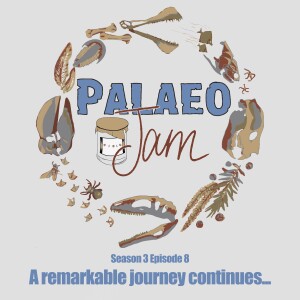
Saturday Sep 14, 2024
A remarkable journey continues
Saturday Sep 14, 2024
Saturday Sep 14, 2024
Just over 12 months ago, as part of National Science Week, we spoke with Eleanor Beidatsch, in an episode titled, “A Journey into accessibility: Digging for fossils from a wheelchair.” Since that episode, Eleanor has graduated from the University of New England with First Class Honours, been awarded the $130,000 #ElevateSTEM scholarship for postgraduate research from the Australian Academy of Technological Sciences and Engineering, and has started her Masters!
As we noted in the notes to last year’s episode, “as a nine year old, Eleanor dreamed of being a palaeontologist, but always presumed her advanced physical disability, and use of a wheelchair would make “digging about in the dirt for fossils” impossible.”
In this episode of Palaeo Jam host Michael Mills chats with Eleanor about another remarkable 12 months, and about what lies ahead as she continues her brilliant journey in the world of palaeontology, and follows her fascination with prehistoric velvet worms!
Check out this story from the ABC about Eleanor’s graduation…
https://www.abc.net.au/news/2024-05-26/eleanor-beidatsch-graduates-first-class-honours-geoscience/103839886
Here’s a link to last year’s episode with Eleanor…
https://palaeojam.podbean.com/e/a-journey-into-accessibility-digging-for-fossils-from-a-wheelchair/
Check out this video from Eleanor’s YouTube channel of her remarkable adventure in 2016, to a paleontological dig in the opal rich desert town of Lightning Ridge, New South Wales…
https://www.youtube.com/watch?v=aTGxIR_yaNo
Here’s a story about Eleanor’s journey on the University of New England’s website…
https://www.une.edu.au/connect/news/2022/09/unearthing-discrimination-in-science
Along with studying palaeontology, Eleanor is a disability rights journalist, and writes for the ABC…
https://www.abc.net.au/news/eleanor-beidatsch/101651018
Here’s a link to the Elevate STEM website…
https://www.atse.org.au/what-we-do/pathways-into-through-stem/elevate/
You can find Eleanor on Instagram at…
https://www.instagram.com/eleanor.beidatsch/
And on Twitter at…
https://twitter.com/EBeidatsch
Here’s a link to Eleanor’s blog Accessible 4 Me…
https://accessible4me.wordpress.com/
For more information on the research being undertaken by the team at University of New England’s Palaeoscience Research Centre, head to
https://www.une.edu.au/research/research-centres-institutes/palaeoscience-research-centre
You can find Michael at @heapsgood https://twitter.com/Heapsgood
To connect with Dinosaur University on Facebook, follow us at https://www.facebook.com/DinosaurUniversity
At Palaeo Jam, we now have an Instagram account at https://www.instagram.com/palaeo_jam
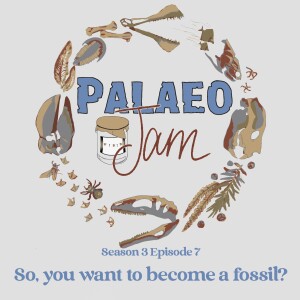
Friday Aug 16, 2024
So, you want to become a fossil?
Friday Aug 16, 2024
Friday Aug 16, 2024
So, you want to become a fossil? Good luck with that! There’s a whole sequence of things that need to take place in order for that to happen, and in this episode of Palaeo Jam, we explore those steps, and how unlikely it is that you will be able to complete all of them.
Recorded underground in Blanch Cave, in the Naracoorte Caves, South Australia, this episode sees host Michael Mills in conversation with PhD candidate Nerita Turner. Nerita’s work focuses on the modes of accumulation of large animal remains in caves, and we explore the unlikelihood becoming a fossil through the lens of her work. In order to become a fossil in a cave, you need to get into a cave in the first place. How does this impact on the size and kinds of animals that might then become fossils within a cave?
During the conversation Nerita describes the fossil record as “Infamously incomplete”. So, how incomplete is it? Consider the following… There are 1400 dinosaur species of dinosaurs that have been discovered and named across the entire Mesozoic, while right now there are around 11 000 species of living dinosaurs, in birds. How many dinosaur species lived across the entire 186 million year period of the Mesozoic? We will never know.
Of course, what we do know, is truly remarkable, and a testament to the work of so many. Palaeontology is able to provide us with some remarkable insights into past lives. to uncover past lives. It is important, however, to understand, that we get to see will only ever be a tiny glimpse of the extraordinary natural history, of this most astonishing planet.
Nerita Turner is a PhD Candidate at the University of Adelaide. Her research focuses on the modes of accumulation of large animal remains in caves, with a particular focus on fossil sites within the Naracoorte Caves region.
You can find Nerita on Twitter at https://twitter.com/nerita_turner
Check out the following article, by Nerita and Dr Elizabeth Reed…
“Using historical research to constrain the provenance and age of the first recorded collection of extinct Pleistocene large mammal fossils from the Naracoorte Caves, South Australia.”
https://www.tandfonline.com/eprint/M7JARRBWBXBWDCFDGIIY/full?target=10.1080/03721426.2023.2188442
Michael occasionally pops in to the strange place that is Twitter at @heapsgood https://twitter.com/Heapsgood
To connect with Dinosaur University on Facebook, follow us at https://www.facebook.com/DinosaurUniversity
At Palaeo Jam, we now have an Instagram account at https://www.instagram.com/palaeo_jam
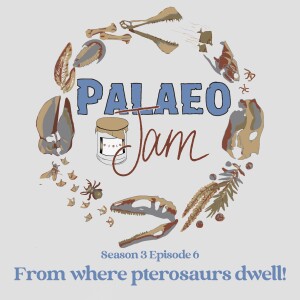
Friday Jul 26, 2024
From where pterosaurs dwell
Friday Jul 26, 2024
Friday Jul 26, 2024
In this episode of Palaeo Jam, host Michael Mills begins the conversation with Dr Natalia Jagielska, Engagement & Collections Curator at the Lyme Regis Museum by chatting about palaeontology pioneer Mary Anning, and what it means to be working in the very space Mary’s home in Lyme Regis once occupied. As the conversation continues, we learn about the first pterosaur ever found in Scotland, Dearc sgiathanach, and what it tells us about pterosaur evolution. In so doing, we reflect on the unique connection between Natalia and Mary, given Mary’s discovery of the first known pterosaur in England, Dimorphodon macronyx. The two also discuss a subject central to both Natalia and Michael’s professional working life, the connection between art and science.
This is the first episode of Palaeo Jam to feature a guest from beyond the shores of Australia. May there be many more!
Head to Natalia’s website to see links to her research, public outreach, and awesome palaeo art…
https://natalia-jagielska.weebly.com/
You can find Natalia on Twitter at… @wrycritic
https://x.com/WryCritic
To access the original paper, authored by Natalia et al on the Scottish pterosaur Dearc sgiathanach, head to…
https://www.sciencedirect.com/science/article/pii/S096098222200135X
For links to the Lyme Regis Museum, check out…
https://linktr.ee/lymemuseum
There’s a song about pterosaurs on the Professor Flint/Gemma Dandie album, “These Curious Things”, and you can watch a video of the song here… https://youtu.be/_ZJzRVO8ZK4?si=w2r39cTFVmiRijTo
You can find links to the album, and more information about Mary Anning, here… https://linktr.ee/thesecuriousthings
Michael occasionally pops in to the strange place that is Twitter at @heapsgood https://twitter.com/Heapsgood
To connect with Dinosaur University on Facebook, follow us at https://www.facebook.com/DinosaurUniversity
At Palaeo Jam, we now have an Instagram account at https://www.instagram.com/palaeo_jam
This is the second episode in Season 3 in which pterosaurs feature. Check out Episode 3 in which Michael chats with vertebrate Palaeontologist and expert in Australian pterosaurs Adele Pentland of the “Pals in Palaeo” podcast about Australian pterosaurs, about each of their podcasts, and about science heroes…
https://palaeojam.podbean.com/e/me-and-my-palaeo-pal/
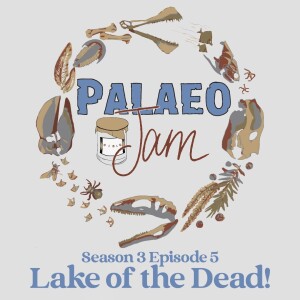
Wednesday Jun 26, 2024
Lake of the Dead
Wednesday Jun 26, 2024
Wednesday Jun 26, 2024
Tens of thousands of years ago, in and around what is known as Lake Callabonna, in outback South Australia, all manner of now extinct Australian animals dwelt. But whether they walked, or slithered, or crawled, or hopped, or flew, or swam in that place, it was soon to become what has been described in an ABC Australia documentary series as the “Lake of the Dead”.
In this episode of Palaeo Jam we travel back in time with host Michael Mills, and Dr Aaron Camens and Dr Phoebe McInerney of Flinders University to find who it was that once lived in and around this “Lake of the Dead”, and what it might have been like had we the ability to transport ourselves, and take a stroll along the banks of what was once a heathy, freshwater ecosystem.
You can hear more from both Aaron and Phoebe, and several other past Palaeo Jam guests in the remarkable two-part series, from ABC Australia’s Catalyst, in “Megafauna: What Killed Australia’s Giants?”. Head to the ABC iView site at https://iview.abc.net.au/ and search for the series there.
You can follow Aaron on Twitter at https://twitter.com/DiprotoRon, and check out his Flinders University profile at https://sites.flinders.edu.au/palaeontology/home/people/academics/aaron-camens/
Amongst his extensive research work, Aaron co-authored a paper that gave us a more complete picture of the largest marsupial predator known, and a former resident of the area, Thylacoleo carnifex…
https://journals.plos.org/plosone/article?id=10.1371/journal.pone.0208020
Phoebe is on Twitter at https://twitter.com/Phoebyornis
Check out her recent article in The Conversation about the skull of Genyornis, discussed in this episode…
https://theconversation.com/new-fossils-show-what-australias-giant-prehistoric-thunder-birds-looked-like-and-offer-clues-about-how-they-died-out-221599
You can find host Michael Mills on Twitter at @heapsgood https://twitter.com/Heapsgood
To connect with Dinosaur University on Facebook, follow us at https://www.facebook.com/DinosaurUniversity
At Palaeo Jam, you can also follow our Instagram account at https://www.instagram.com/palaeo_jam
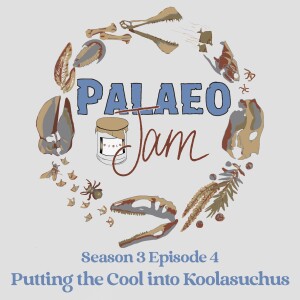
Friday May 31, 2024
Putting the Cool into Koolasuchus
Friday May 31, 2024
Friday May 31, 2024
In 1990, Mike Cleland was fossicking around a coastal region of the state of Victoria in Australia, when he came across a fossil discovery that was to change his life. The fossil he discovered was to become known as Koolasuchus cleelandi, and in 2022, Koolasuchus to became the state’s official fossil emblem, following a public vote.
In this episode of Palaeo Jam, host Michael Mills chats with Mike, and Lesley Kool, after whom the first part of Koolasuchus, was named, about this extraordinary, prehistoric amphibian. Along the way, we discover Lesley’s role in the discovery and understanding of this remarkable fossil, and what it is about this car sized amphibian that makes it such a worthy fossil emblem.
For more information on the region where Koolasuchus was found, head to…
http://dinosaurdreaming.monash.edu/
You can also check out the Dinosaur Dreaming blog at…
http://dinodreaming.blogspot.com/
And find out more about the Victorian coastal dinosaur trail, here…
https://engage.basscoast.vic.gov.au/dino
You can find host Michael Mills on Twitter at @heapsgood https://twitter.com/Heapsgood
To connect with Dinosaur University on Facebook, follow us at https://www.facebook.com/DinosaurUniversity
At Palaeo Jam, you can also follow our Instagram account at https://www.instagram.com/palaeo_jam
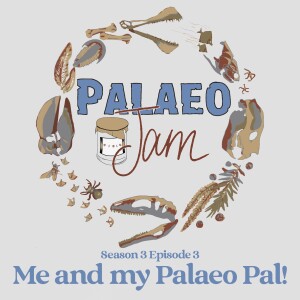
Friday May 17, 2024
Me and my Palaeo Pal!
Friday May 17, 2024
Friday May 17, 2024
What happens when two people who create palaeontology podcasts get together for a chat? Tune in to find out!
In this episode of Palaeo Jam, host Michael Mills chats with vertebrate Palaeontologist and expert in Australian pterosaurs Adele Pentland of the “Pals in Palaeo” podcast about Australian pterosaurs, about each of their podcasts, and about science heroes.
Along the way we get an insight into where Australian pterosaurs fit within the global pterosaur community, come to understand why science communication matters, and how it is that their palaeontology podcasts are a thing!
You can find Adele’s awesome podcast, “Pals in Palaeo” through the following link… https://linktr.ee/palsinpalaeo
Be sure to follow the podcast on Instagram at https://www.instagram.com/palsinpalaeo/
You can also head to the Pals in Palaeo website at https://palsinpalaeo.com/
Here’s a link to an article by Adele about Ferrodraco lentoni… the pterosaur that Adele named, and that we discuss in the podcast…
https://theconversation.com/4-metre-flying-reptile-unearthed-in-queensland-is-our-best-pterosaur-fossil-yet-124581
And here’s a link to another article by Adele of the fascinating pterosaurs that are being discovered in Australia… https://theconversation.com/these-magnificent-107-million-year-old-pterosaur-bones-are-the-oldest-ever-found-in-australia-206501
Speaking of pterosaurs, there’s a song about pterosaurs on the Professor Flint/Gemma Dandie album, “These Curious Things”, and you can watch a video of the song here… https://youtu.be/_ZJzRVO8ZK4?si=w2r39cTFVmiRijTo
You can find links to the album, and more information about Michael’s science hero Mary Anning, here… https://linktr.ee/thesecuriousthings
You can find Michael on Twitter at @heapsgood https://twitter.com/Heapsgood
To connect with Dinosaur University on Facebook, follow us at https://www.facebook.com/DinosaurUniversity
At Palaeo Jam, we now have an Instagram account at https://www.instagram.com/palaeo_jam
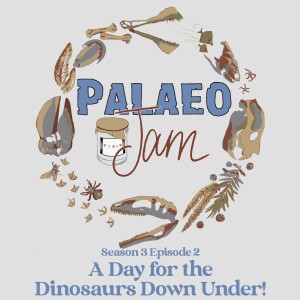
Tuesday May 07, 2024
A Day for the Dinosaurs Down Under!
Tuesday May 07, 2024
Tuesday May 07, 2024
May 7th has come to be known as Australia’s National Dinosaur Day! A day in which Australians are being asked to celebrate the remarkable dinosaurs that once walked where we now walk. Or as we like to call them, the Dinosaurs Down Under!
What is the significance of May 7th? And how did this date, in particular, become the day now known as Australia’s National Dinosaur Day?
Phil Hore has worked in a lot of cool places, including the Smithsonian, the Field Museum and the Australian Dinosaur Museum! He’s also written lots, including as a regular writer for The Prehistoric Times. In this special edition of Palaeo Jam to celebrate Australia’s National Dinosaur Day, host Michael Mills chats with Phil about where the idea for the day came from, how it has grown in recent years, why Australian dinosaurs matter, and what his key role has been in making this a day to remember!
You can find Australia’s National Dinosaur Day on Facebook at…
https://www.facebook.com/Australiannationaldinosaurday
If you’re ever in Rockhampton, be sure to check out Phil’s Time Safaris Walking Tours…
https://www.timesafaris.com.au/
https://www.facebook.com/timesafaris
Phil has been known to Tweet now and again at https://twitter.com/Phil_Hore
Here’s a link to The Prehistoric Times magazine…
https://pocketmags.com/au/prehistoric-times-magazine
Michael Mills’ alter ego, singing palaeontologist Professor Flint, released a brand new version of the “Dinosaurs Down Under” album, earlier this year. You can find it, and other Prof Flint things, here…
https://linktr.ee/ProfessorFlint
You can find Michael at @heapsgood https://twitter.com/Heapsgood
To connect with Dinosaur University on Facebook, follow us at https://www.facebook.com/DinosaurUniversity
At Palaeo Jam, we have an Instagram account at https://www.instagram.com/palaeo_jam
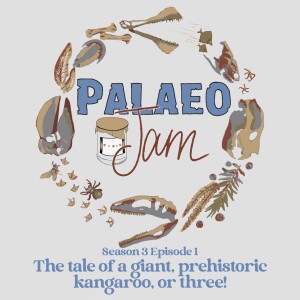
Saturday Apr 27, 2024
The tale of a giant, prehistoric kangaroo... Or three!
Saturday Apr 27, 2024
Saturday Apr 27, 2024
We’re back for Season 3, and we begin in the palaeo lab at Flinders University!
We’re delighted that in this first episode of the new season, Palaeo Jam host Michael Mills chats with Dr Isaac Kerr about a remarkable research paper, just published, that seeks to more clearly define what is and what isn’t a Protemnodon… AKA a giant, prehistoric kangaroo!
During the course of the conversation, we hear from Isaac about the features that define this particular group of giant, prehistoric marsupials, but also, the fascinating differences amongst them. We talk about about who’s in, and who’s out of the genus, and along the way, we hear about the fascinating ways in which these extraordinary kangaroos lived their lives, depending upon where they lived. As a bonus, we also hear about how Isaac and his team were able to ditch a previously described species by none other than Sir Richard Owen!
You can follow Dr Isaac Kerr on Twitter at @isaacarkerr https://twitter.com/IsaacARKerr
You can read the full 250 plus pages of this remarkable paper, here…
https://mapress.com/mt/article/view/megataxa.11.1.1
Check out the following article by Isaac in The Conversation…
https://theconversation.com/we-found-three-new-species-of-extinct-giant-kangaroo-and-we-dont-know-why-they-died-out-when-their-cousins-survived-227857
Here’s a link to the Flinders University palaeo team…
https://sites.flinders.edu.au/palaeontology/
And here’s an article on the ABC about this amazing paper…
https://www.abc.net.au/news/2024-04-15/three-unique-extinct-kangaroo-species-discovered-flinders-uni/103699606
You can find Michael Mills at @heapsgood https://twitter.com/Heapsgood
To connect with Dinosaur University on Facebook, follow us at https://www.facebook.com/DinosaurUniversity
At Palaeo Jam, we now have an Instagram account at https://www.instagram.com/palaeo_jam
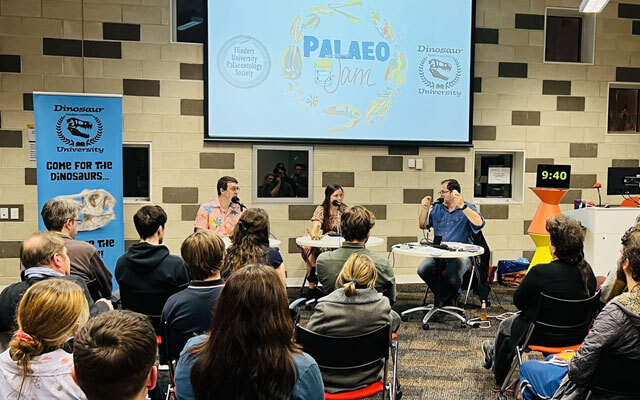
About Palaeo Jam
Palaeo Jam is a podcast exploring a range of issues in science and the community, using the multidisciplinary aspects of, and public fascination with, palaeontology. It is an Australian-based palaeo podcast, which launched at a publicly accessible live event at Flinders University, where the first two episodes were recorded in front of an audience.
The format for Palaeo Jam is as follows
- Palaeo Jam uses fossils and other objects from palaeontology to explore a range of scientific and social issues, and incorporate key research and discoveries into its content. Each guest brings an object.
- Each episode has a theme.
- Each episode is strictly 30 minutes in length. There is always a timer present, and visible to the audience in live records.
- Each episode has a panel of up to four, including Michael Mills as the host. We aim to give voice to researchers who don’t often get the opportunity to participate in such forums.
- Palaeo Jam is discussion, curiosity, and exploration, rather than being a collection of presentations. Through pondering connections between items, we hope to uncover insights and delve into unusual and interesting corners of palaeontology.
- Show notes for people to dive deeper are uploaded to this website, with the work of each panelist being highlighted.







